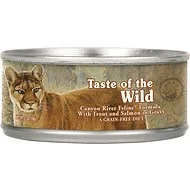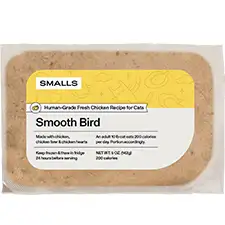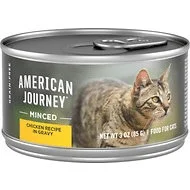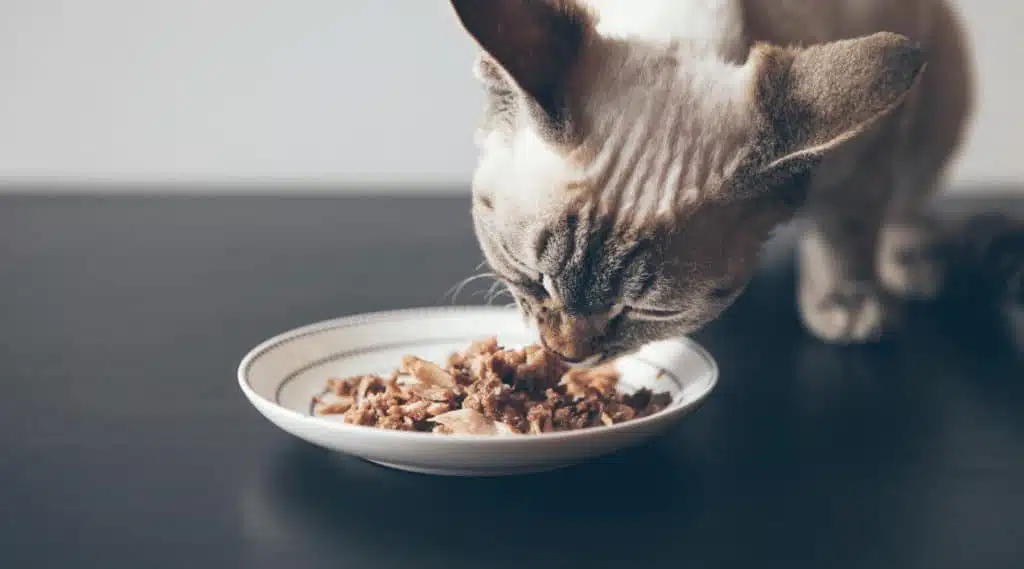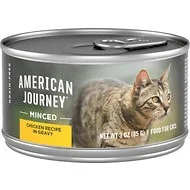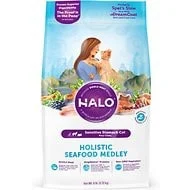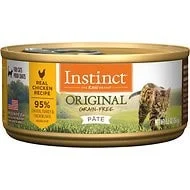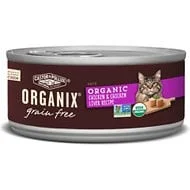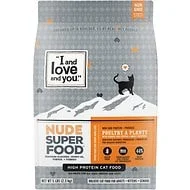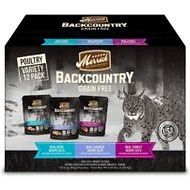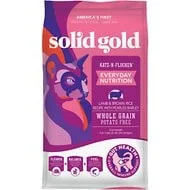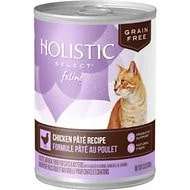10 Best Cat Foods for Regurgitation in 2024
Quick Guide
- What Is The Best Cat Foods for Regurgitation?
- Understanding the Difference Between Regurgitation and Vomiting
- What Causes Regurgitation in Cats?
- What to Look for in a Good Cat Food for Regurgitation
- How Do We Make Our Recommendations?
- The 9 Best Cat Foods for Regurgitation
- 6 More Top-Rated Cat Foods for Regurgitation
- Instinct by Nature’s Variety Original Grain-Free Real Chicken Recipe Canned Food
- Castor & Pollux Organix Grain-Free Organic Chicken & Chicken Liver Recipe Canned Food
- I and Love and You Nude Food Poultry a Plenty Grain-Free Dry Food
- Merrick Backcountry Grain-Free Morsels in Gravy Real Chicken Recipe Cats Cat Food
- Solid Gold Katz-n-Flocken Lamb & Brown Rice Recipe with Pearled Barley Whole Grain Dry Food
- Holistic Select Chicken Pate Recipe Grain-Free Canned Cat & Kitten Food
- Frequently Asked Questions
You do your best to buy your cat the highest quality cat food you can afford. You spend your hard-earned money and pride yourself in putting something healthy in front of your cat. He sniffs it excitedly and gobbles it up then looks at you for a moment to see if you’ll give him seconds. If not, he walks away. You go about your business but then you hear it – that unmistakable mewling and wheezing. Moments later your cat has regurgitated his entire meal all over the floor.
Your cat regurgitating food is an annoyance, but is it cause for concern? The truth is that there’s a difference between regurgitation and vomiting, and each has its own unique causes. Regurgitation could be a fluke caused by your cat eating too fast, but if you find your cat regurgitating every day, you might want to talk to your veterinarian about it.
In this article, we’ll talk about the unsavory topic of regurgitation in cats. We’ll explore the differences between regurgitation and vomiting and talk about the causes of regurgitation in cats. From there, we’ll talk about some options for treatment and give you some recommendations for potentially changing your cat’s diet to resolve the issue.
What Is The Best Cat Foods for Regurgitation?
- Smalls Human-Grade Fresh Bird Cat Food Delivery
- Taste of the Wild Rocky Mountain Grain-Free
- American Journey Minced Chicken Recipe in Gravy
- Halo Holistic Seafood Medley Sensitive Stomach
- Instinct by Nature’s Variety Original Grain-Free Real Chicken
- Castor & Pollux Organix Grain-Free Organic Chicken & Chicken
- I and Love and You Nude Food Poultry a Plenty Grain-Free
- Merrick Backcountry Grain-Free Morsels in Gravy Real Chicken
- Solid Gold Katz-n-Flocken Lamb & Brown Rice Recipe with Pearled
- Holistic Select Chicken Pate Recipe Grain-Free Canned Cat & Kitten
Understanding the Difference Between Regurgitation and Vomiting
When you step into a fresh puddle of regurgitated food or liquid, you probably don’t pause for a moment to ask yourself what it is – you’re too busy hopping around on one foot until you can take off your wet sock. Once the initial disgust has passed, you can go back and take a closer look to determine whether it’s a hairball or if it’s something your cat has vomited or regurgitated up.
What’s the difference? A hairball is an accumulation of hair a cat vomits up when it accumulates in the digestive tract but can’t be passed. Regurgitation is when undigested food moves back up the esophagus and is expelled through the mouth, often in a tube-like pile. If it occurs up to 2 hours after eating, it is more likely to be regurgitation than vomiting.
Here are some of the other symptoms that may accompany regurgitation in cats:
- Fever
- Lethargy
- Coughing
- Weight loss
- Runny nose
- Difficulty swallowing
- Bad breath
- Ravenous appetite
- Loud breathing
- Swelling in the neck
Regurgitation in cats can affect any breed, though Siamese cats and breeds related to the Siamese seem to be predisposed to the condition. You may or may not notice any of the additional symptoms listed above, but you will notice a certain series of events if you see your cat regurgitating food every day. After wolfing down his meal he’ll hunker down on all fours, lower his head, and expel the food with little effort, typically in an elongated tube-like pile. The food may appear to be chewed and covered in mucus, but it won’t be digested since it didn’t reach the stomach to be broken down by acid.
Now that you have a better understanding of regurgitation in cats, let’s take a closer look at the potential causes for this problem and how changing your cat’s diet can help.
What Causes Regurgitation in Cats?
In many cases, a cat regurgitating undigested food is nothing to worry about. That is, of course, assuming that it occurs infrequently. A cat regurgitating every day may be more concerning. There are several medical problems which can lead to regurgitation:
- Defects in the throat, often congenital
- Congenital abnormalities in the esophagus
- Cancer or foreign body in the throat
- Myopathy, or muscular problems in the throat
- Esophageal disease or narrowing of the esophagus
In other cases, it may simply be a problem with the food. If your cat eats too much at once or more quickly, he may be more prone to regurgitation. Some cats have trouble keeping down food when the pieces are too large or if there isn’t enough moisture. Cats who eat dry food only may end up drinking a lot of water right after a meal which can lead to regurgitation.
If you’re concerned about your cat’s regurgitation, talk to your veterinarian. He will ask you questions about when and how often the problem happens and what other symptoms you’ve noticed. Based on this information, he may recommend certain tests to determine whether there is an underlying health problem to blame and, in extreme cases, may even recommend x-rays or other imaging tests to check for abnormalities and obstructions.
Treatment for regurgitation in cats depends on the underlying cause of the problem. If there is damage to the esophagus or an abnormality that prevents regular feeding, your cat may require hospitalization and IV therapies. Surgical correction may be required in extreme cases. In the same way that treatment varies according to the underlying cause, so does the prognosis. In idiopathic cases, or cases where the cause is unknown, changing your cat’s feeding habits might be all that is required.
What to Look for in a Good Cat Food for Regurgitation
If your veterinarian rules out esophageal abnormalities, cancer, and other underlying causes for regurgitation, your best option is to modify your cat’s diet to see if you can resolve the issue. You might try experimenting with different consistencies to see if that helps – many cats regurgitate dry food more than wet food. You might also try feeding your cat smaller portions at a time or switching to a food that comes in smaller pieces.
In addition to making these changes, you should make sure your cat’s food is as nutritious as possible so when he is able to keep it down, it will help prevent nutrient and calorie deficiencies that can result from frequent regurgitation. There is no specific cat food for regurgitation, but some vets suggest a high-quality diet rich in animal protein and free from low-quality grains, by-products, and artificial additives that might upset the cat’s stomach.
Here are some general things to look for in a good cat food for regurgitation:
- Rich in real animal protein. Real animal protein should be the foundation of any cat’s diet. Things like meat, poultry, and fish should be the first ingredient in anything you feed your cat, ideally in concentrations of 30% or more.
- Increased moisture content. Many cats regurgitate dry food more often than wet food, so switching your cat to a canned food or added a wet food topper might help ease his digestion.
- Limited carbohydrate content. Cats are obligate carnivores, so carbohydrates should not be a major component of their diets. Some cats are sensitive or allergic to low-quality grains like corn and wheat as well, so look for highly digestible, nutritious carbohydrates like whole grains, fruits, and vegetables in limited concentrations.
- Complete and balanced. The higher the quality of your cat’s food, the more digestible it will be. Animal proteins, whole grains, fruits, and vegetables are the best natural sources for vitamins and minerals, but most cat foods contain supplements as well to ensure complete and balanced nutrition.
- Free from artificial additives. Low-quality grains, fillers, and by-products can upset your cat’s stomach, as can artificial additives like flavors, colors, and preservatives. Avoiding these ingredients may make your cat’s food more digestible to reduce regurgitation in addition to improving the nutritional quality.
Every cat is different, so you may need to experiment with a few different types of food to see which one works for your cat. Some cats do just fine with dry food if they slow down when eating while others require a wet food diet to keep the food down. We’ve compiled an assortment of different options that meet the requirements above and pass our rigorous review process. Check them out!
How Do We Make Our Recommendations?
No matter what kind of health problems your cat is dealing with, a high-quality diet is a must-have. We would never recommend a product that we wouldn’t feed our own cat, so you can trust us to do the research and evaluate every product before we recommend it. We understand that cats are obligate carnivores which means that they have a biological requirement for a high-protein diet. Every recipe we recommend starts with a real animal-based protein as the main ingredient and may contain several supplemental proteins as well. We look for animal-based fats with a blend of omega-3 and omega-6 fatty acids as well as limited content of digestible carbohydrates.
Here are some of the requirements for a cat food to receive our recommendation:
- A source of high-quality animal protein as the first ingredient
- At least 30% crude protein for kittens and at least 26% for adults
- A minimum of 9% crude fat for kittens and adults
- A balance of omega-3 and omega-6 fatty acids, primarily from animal sources
- A rich blend of nutrients from natural sources and supplements, as needed
- Limited carbohydrate content from digestible sources (like whole grains and veggies)
- No low-quality fillers, by-products, or artificial additives (preservatives, dyes, or flavors)
The 9 Best Cat Foods for Regurgitation
Every cat is different and the right food for one cat might not work for the next cat. It is sometimes difficult to tell exactly what is causing your cat’s regurgitation issues, so you may simply need to use the process of trial and error to find a food that works. Though the food you choose will largely be up to your cat’s preference, you should only throw into the mix foods made with high-quality natural ingredients that will provide for your cat’s nutritional needs.
Here are our top picks for the best cat food for regurgitation:
| Our 2024 Picks: Overall Best Foods for Regurgitation | |||
Smalls Fresh Human-Grade Cat Food
|
CHECK PRICE | ||
Taste Of The Wild Canyon River Grain-Free
|
CHECK PRICE | ||
American Journey Minced Chicken Recipe
|
CHECK PRICE | ||
Halo Holistic Seafood Medley Sensitive Stomach
|
CHECK PRICE | ||
Instinct by Nature’s Variety Original Grain-Free Real Chicken
|
CHECK PRICE | ||
Castor & Pollux Organix Grain-Free Organic Chicken & Chicken Liver
|
CHECK PRICE | ||
I and Love and You Nude Food Poultry a Plenty
|
CHECK PRICE | ||
Merrick Backcountry Grain-Free Morsels in Gravy
|
CHECK PRICE | ||
Solid Gold Katz-n-Flocken Lamb & Brown Rice Recipe
|
CHECK PRICE | ||
Holistic Select Chicken Pate Recipe Grain-Free
|
CHECK PRICE | ||
Smalls Human-Grade Fresh Bird Cat Food
Overall Best Food for Regurgitation in Cats: When it comes to a high-quality diet for cats, many animal nutritionists recommend fresh food. Fresh cat food is high in moisture than dry food and offers improved taste, texture, and palatability. These things may help reduce your cat’s regurgitation issues or, at the very least, will provide him with a high-quality source of nutrition in the food he does manage to keep down. Smalls is our favorite brand of fresh pet food and they send deliveries right to your door in regular shipments. Simply provide some basic information about your cat’s age, weight, and activity level and they will calculate his calorie needs. You’ll then start receiving regular shipments of pre-portioned packages of cat food you simply open and pour into your cat’s bowl. Choose from two recipes made with real animal proteins and other wholesome natural ingredients to deliver premium quality nutrition.
- Pros: Fresh food delivered to your door, real animal proteins and wholesome natural ingredients, customized calorie content, simply open the bag and pour
- Cons: Only two recipes to choose from, significantly more expensive than traditional kibble
Taste of the Wild Rocky Mountain Grain-Free Canned Food
Most Popular Cat Food for Regurgitation: Cat food brands are a dime a dozen, so how do you choose just one? If you simply can’t decide, you should at least go with a brand that has a good reputation like Taste of the Wild. One of the most popular pet food brands on the market, Taste of the Wild is known for using premium roasted meats in all of their recipes as well as other wholesome, natural ingredients. This Rocky Mountain Grain Free Canned Food is a great choice for cats who suffer from regurgitation because it is rich in moisture and highly digestible. It features fresh salmon as the main ingredient with chicken liver, fresh chicken, smoked salmon, roasted venison, and ocean fish as supplemental sources of protein. It also contains a rich blend of omega-3 and omega-6 fatty acids for healthy skin and coat with fresh fruits and veggies as natural sources for key vitamins and minerals.
- Pros: Highly trusted brand, premium roasted meats, rich in animal protein and healthy fats, highly digestible natural ingredients, fresh fruits and vegetables, chelated mineral supplements
- Cons: May be too high in fiber for some cats
American Journey Minced Chicken Recipe in Gravy Grain-Free Canned Food
Most Affordable Cat Food for Regurgitation: High-quality cat food can be expensive, but the American Journey brand is highly affordable for the level of quality it delivers. If your cat has regurgitation issues, this Minced Chicken Recipe in Gravy Grain-Free Canned Food could be a good option. It features real bits of meat in savory gravy with a flavor and texture cats love. This recipe features fresh chicken as the main ingredient with chicken and turkey broths for moisture and natural flavor. Sunflower oil and fish oil provide a rich blend of omega-3 and omega-6 fatty acids for healthy skin and coat while cranberries support urinary health. Overall, this recipe is complete and balanced with the help of vitamins and chelated mineral supplements.
- Pros: Rich in protein and natural flavor, real chicken first ingredient, rich blend of omega fatty acids, complete and balanced nutrition, chelated mineral supplements
- Cons: First source of fat is plant-based
Halo Holistic Seafood Medley Sensitive Stomach Formula Dry Food
Best Food for Regurgitation and Sensitive Stomachs in Cats: If your cat is sensitive or allergic to certain ingredients, it can make his regurgitation problems worse. We like this Halo Holistic Seafood Medley formula because it is uniquely designed for cats with sensitive stomachs and food allergies. This holistic natural recipe features real whitefish and salmon as the top two ingredients along with wholesome grains like oatmeal and pearled barley. Chicken fat provides a rich source of energy and nutrients, supplemented with flaxseed for omega-3 fatty acids. This formula contains dried fruits and vegetables for nutritional support as well as chelated minerals to ensure optimal nutrient absorption. It is highly digestible and loaded with quality nutrition.
- Pros: Holistic natural recipe, formulated for sensitive stomach and food allergies, rich in real animal protein, wholesome grains, dried fruits and veggies, chelated minerals
- Cons: Contains some plant protein (soy protein and potato protein)
6 More Top-Rated Cat Foods for Regurgitation
Instinct by Nature’s Variety Original Grain-Free Real Chicken Recipe Canned Food
If you’re looking for a high-protein, all-natural cat food to nourish your cat’s health and reduce regurgitation, consider this Instinct by Nature’s Variety Original Grain-Free Real Chicken Recipe. Packed with premium animal protein, this recipe features cage-free chicken as the first ingredient and a rich source of lean protein. This recipe contains 95% chicken, turkey, and chicken liver with the remaining 5% from vegetables, fruits, and other wholesome ingredients. It is completely free from grains including corn, wheat, and soy as well as potatoes, by-products, and artificial additives. Plus, it is complete and balanced with the help of vitamins and chelated mineral supplements.
Castor & Pollux Organix Grain-Free Organic Chicken & Chicken Liver Recipe Canned Food
Formulated for all life stages, this organic chicken recipe canned food is a great option for any cat. It starts with fresh, organic chicken as the main ingredient with supplemental protein from organic chicken liver and organic eggs. Organic peas and coconut flour provide grain-free sources of digestible carbohydrate with an assortment of organic fruits and vegetables for nutritional support. This recipe does contain some plant protein, but it is rich in omega fatty acids for skin and coat support, plus it is extremely high in quality thanks to the organic natural ingredients.
I and Love and You Nude Food Poultry a Plenty Grain-Free Dry Food
If you prefer the convenience of dry food, you should at least feed your cat something as good as this I and Love and You Nude Food Poultry a Plenty Grain-Free Dry Food. This recipe is holistic and all-natural, made with simple, wholesome ingredients to deliver complete and balanced nutrition. It contains whole, deboned turkey as the first ingredient with chicken meal and turkey meal as supplemental sources of protein. Chicken fat and ground whole flaxseed provide plenty of omega-3 fatty acids, balanced with olive oil for omega-6s. Overall, this recipe is packed with nutrition from premium natural ingredients.
Merrick Backcountry Grain-Free Morsels in Gravy Real Chicken Recipe Cats Cat Food
Many cats have fewer problems with regurgitation on a wet food diet than a dry food diet. The problem is, some cats are picky and don’t seem to like the texture of most canned foods. If your cat prefers dry food, you can still add moisture and nutrition with this Merrick Backcountry Grain-Free Morsels in Gravy Real Chicken Recipe. This recipe features protein-rich morsels in a savory gravy, made with real chicken as the first ingredient. Chicken and turkey broths provide a flavorful source of moisture while chicken liver, deboned turkey, and dried egg whites supply supplemental protein. You’ll be glad to know that this recipe is completely and balanced in case you decide to use it as your cat’s staple diet.
Solid Gold Katz-n-Flocken Lamb & Brown Rice Recipe with Pearled Barley Whole Grain Dry Food
Your cat deserves premium-quality nutrition and that’s exactly what this Solid Gold Katz-n-Flocken Lamb & Brown Rice Recipe delivers. Featuring fresh lamb as the main ingredient, this recipe also contains nutritious whole grains like brown rice and pearled barley. Chicken meal and ocean fish meal provide supplemental sources of protein while canola oil and salmon oil ensure a rich blend of omega-3 and omega-6 fatty acids for healthy skin and coat. Probiotics support healthy and regular digestion in this high-quality cat food formulated for everyday nutrition.
Holistic Select Chicken Pate Recipe Grain-Free Canned Cat & Kitten Food
If your kitten already has a sensitive stomach, you may be hesitant to change him to a different cat food when he becomes an adult. This Holistic Select Chicken Pate Recipe Grain-Free Canned Cat & Kitten Food could be the ideal solution because it is complete and balanced for kittens as well as adult cats. It is highly digestible and loaded with healthy natural ingredients, not to mention plenty of moisture and natural meat flavor. This recipe is loaded with protein, supplemented with plenty of omega fatty acids, and is complete and balanced with the help of vitamins and chelated minerals.
Frequently Asked Questions
- Why is my cat throwing up her food? If your cat is throwing up food, you should take a closer look at it to see whether it is vomit or regurgitation. Vomit occurs several hours after the food has been eaten and it will be partially digested by stomach acids. Regurgitation occurs 30 minutes to 2 hours after eating, sometimes sooner, and the food comes up fairly easily, often undigested and in a tubular shape. Regurgitation often occurs when the cat eats too fat, eats too much at once, or drinks too much water after eating. In some cases, however, it is due to an underlying health problem such as abnormalities or obstructions in the esophagus or throat.
- Should you feed a cat after she vomits? Occasional regurgitation is generally nothing to worry about, but if your cat does it frequently you may want to talk to your veterinarian. You may also find yourself wondering whether you should feed your cat again after the incident. In the case of occasional regurgitation, you may want to simply give your cat’s stomach time to settle to make sure it doesn’t happen again. Wait 30 to 60 minutes then offer your cat a small amount of food. If he keeps it down, resume normal feeding at the next mealtime.
- Is it normal for a cat to throw up every day? It is fairly common for cats to occasional vomit partially or undigested food. It can be a response to stress or simply a matter of eating too fast. If your cat is regurgitating or vomiting every day, however, that is not normal and should be addressed with your veterinarian.
- Why is my cat throwing up white foam? The most common cause for cats vomiting up foam is indigestion. Cats with indigestion may vomit up white or yellow foam, often if they skip a meal and the stomach acids build up and irritate the stomach. The best solution for indigestion is to feed your cat smaller meals more frequently to prevent too much stomach acid from building up at once.
- Is there a home remedy for cat regurgitation? Cats regurgitate for different reasons but if you can isolate the trigger for your cat’s issue, you may be able to resolve it naturally. When your cat regurgitates, make a note of how soon it happens after feeding as well as what type and how much food your cat ate. You may also want to think about other factors like how quickly the cat ate and whether he drank a lot of water afterward. If you can collect these details, you can make changes to the way you feed your cat to slow down his eating. That may be all you need as a home remedy for cat regurgitation.
Hairballs are bad enough, so no cat owner wants to deal with frequent regurgitation on top of them. For the most part, occasional regurgitation is nothing to be concerned about – your cat probably ate too quickly or drank too much water after eating. If it starts to occur regularly, however, you may want to bring it to your vet’s attention. In addition to changing the way your cat eats, consider making changes to his diet as well to maximize nutrition and optimize his health.


